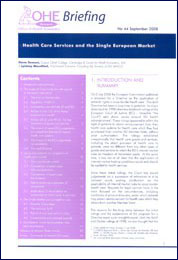In 2008, the European Commission published a proposal for a Directive on the application of patients’ rights in cross-border health care. This followed two 1998 landmark…
In 2008, the European Commission published a proposal for a Directive on the application of patients’ rights in cross-border health care. This followed two 1998 landmark rulings of the European Court of Justice (ECJ) that appeared to affirm the right of patients to…
In 2008, the European Commission published a proposal for a Directive on the application of patients’ rights in cross-border health care. This followed two 1998 landmark rulings of the European Court of Justice (ECJ) that appeared to affirm the right of patients to obtain reimbursement from their own health care systems for health care that they purchased from another EU Member State, without prior authorization.
The rulings established unequivocally that health care goods and services, including the direct provision of health care to patients, were no different from any other type of goods and services to which the EU’s internal market rules on freedom of movement apply. At the same time, it was not at all clear that the application of internal market trading conditions could and should be applied to health services. This Briefing explores key issues in more detail, including: the scope of Community Law vis-à-vis health care delivery; whether the economic growth objectives of the internal market and the solidarity objectives of Member States’ health systems are compatible; the potential impact of increased competition on efficiency, quality and access to health services and the effect of relying on patient choice to promote competition; and the possible implications for England, given current Department of Health policies.
The Briefing urges that the likely influence of the Directive on cross-border patient flows be kept in perspective. Within Europe, the number of patients travelling far from home – either within their own countries or across borders – has been insignificant and no evidence of an impact on provider competition exists. The importance of the Directive for the health care systems of Member States is more likely to be revealed in the extent to which national systems are restructured to avoid future legal challenge, rather than in the number of patients treated cross-border.
